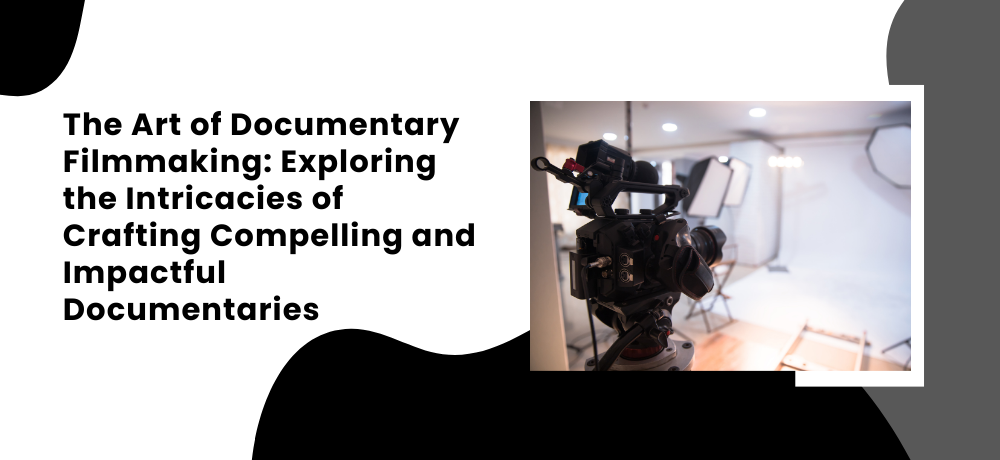The Art of Documentary Filmmaking: Exploring the Intricacies of Crafting Compelling and Impactful Documentaries

Hello there! I'm Lori J. Schroeder, a Video Editor and Director based in Ottawa, ON, and the proud owner of Islandmoss Productions, a dedicated video production company serving the Ottawa community. Today, we're delving deep into the captivating world of documentary filmmaking, where the magic of storytelling meets the precision of cinematography. In this blog post, we'll explore the essence of filmmaking, the unique realm of documentary filmmaking, and the crucial role of cinematography in this captivating craft.
Filmmaking: The Art of Visual Storytelling
At its core, filmmaking is the art of visual storytelling. It's about weaving a narrative using moving images and sound to convey emotions, ideas, and experiences. In this digital age, where videos dominate online content, the importance of mastering the art of filmmaking cannot be overstated.
The Unique Realm of Documentary Filmmaking
Documentary filmmaking, a subset of the broader cinematic world, deserves special attention. Unlike fiction films, documentaries capture real-life stories, providing viewers with a glimpse into the raw, unscripted, and often profound aspects of human existence. But what sets documentary filmmaking apart from other forms of storytelling?
Documentary filmmaking is a powerful tool for shedding light on real issues, giving a voice to marginalized communities, and sparking important conversations. It's a medium through which we can explore the depths of the human experience and engage with diverse perspectives.
Cinematography: Painting with Light
Cinematography, often referred to as the "painting with light," is the cornerstone of filmmaking. It's the art of capturing visually striking and emotionally resonant images. In the world of documentaries, cinematography plays a pivotal role in conveying the authenticity and depth of the subject matter.
Great documentary cinematography is about more than just technical skill; it's about storytelling through visuals. It involves selecting the right angles, framing, and lighting to evoke specific emotions and immerse the audience in the narrative.
The Power of Visual Storytelling in Documentaries
In the realm of documentary filmmaking, visual storytelling takes center stage. Here are some key aspects that make it so potent:
Authenticity: Documentaries thrive on authenticity. Viewers want to connect with real stories and real people. Through visuals, we can capture genuine moments that resonate with authenticity.
Emotional Impact: A well-crafted visual story can tug at heartstrings and leave a lasting impact on the audience. It can make us laugh, cry, and reflect deeply on the subject matter.
Education and Advocacy: Documentaries have the unique ability to educate and inspire action. They can raise awareness about critical issues, advocate for change, and drive social progress.
Diverse Perspectives: Documentaries have the power to amplify diverse voices and shed light on underrepresented stories. They provide a platform for different cultures, communities, and experiences.
The Artistry of Documentary Filmmaking
As a seasoned Video Editor and Director, I've had the privilege of working on a wide range of projects, including corporate videos, documentaries, and music videos. Each genre presents its own set of challenges and opportunities, but documentary filmmaking holds a special place in my heart.
Through the lens of my camera, I've explored the lives of extraordinary individuals, delved into the heart of social issues, and captured the essence of diverse cultures. It's a journey that has not only honed my technical skills but also deepened my appreciation for the power of visual storytelling.
The Evolution of Documentary Filmmaking
The landscape of documentary filmmaking has evolved significantly over the years. It's not just about recording events as they unfold; it's about crafting a narrative that engages and informs the audience. Let's take a brief journey through the history of documentary filmmaking to understand its transformation.
In the early days of cinema, documentaries were often seen as straightforward records of real-life events. They lacked the narrative depth and artistic flair we associate with contemporary documentaries. However, as technology advanced and filmmakers experimented with storytelling techniques, the genre underwent a profound transformation.
In the 1920s, pioneers like Robert J. Flaherty introduced a more cinematic approach to documentaries with films like "Nanook of the North." These films combined stunning visuals with compelling narratives, setting the stage for the future of documentary filmmaking.
The Role of Technology in Documentary Filmmaking
In the digital age, technology has democratized documentary filmmaking. High-quality cameras are more accessible than ever, and editing software allows filmmakers to bring their visions to life with greater ease. This technological revolution has empowered aspiring documentarians to share their stories with the world.
Advancements in equipment, such as drones and portable cameras, have opened up new possibilities for capturing breathtaking footage in challenging environments. These tools have allowed filmmakers to explore remote landscapes, document wildlife, and venture into the heart of communities to tell their stories authentically.
Moreover, the internet and streaming platforms have provided a global stage for documentary filmmakers. Audiences worldwide can now access and engage with these powerful stories, sparking conversations and driving social change.
In the ever-evolving world of documentary filmmaking, the blend of artistry, technology, and storytelling continues to shape the way we perceive the world. It's a medium that has the power to educate, inspire, and connect us on a profound level.
If you're interested in exploring the art of documentary filmmaking further or have any questions about Islandmoss Productions, please don't hesitate to contact me. You can reach me at (613) 513-8209 or email islandmossproductions@gmail.com. Let's embark on a cinematic journey together, where stories come to life and voices are heard.